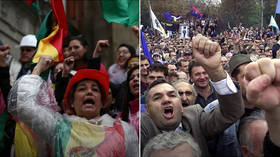Events in Bolivia follow script of ‘color revolution’ – the antithesis of democracy

From the claim of a ‘stolen’ election to the opposition burning ballots and the forced resignation of President Evo Morales, the events in Bolivia have followed the script of the original “color revolution” in Serbia.
A politician critical of Washington seeks re-election, and wins the vote in the first round under the existing rules. Opposition parties cry foul and demand a runoff, only to attack the polling stations and burn the ballots, making an accurate count impossible. Then their demands escalate: the “dictator” must resign without a new vote, the “people power” in the streets demands it.
Yes, this is Bolivia in early November 2019. But I remember it also being Serbia, in early October 2000 – back when it was still known as Yugoslavia. One or two similarities would be a coincidence; this kind of eerie overlap points to something more. Especially when what happened in Serbia would later be identified as the very first case of “color revolution.”
Also on rt.com One step closer to democratic, prosperous, free Western Hemisphere? Trump hails ouster of Bolivia's Evo MoralesThere are two competing narratives when it comes to the ouster of Morales. The one embraced by the mainstream media calls it a democratic triumph of the Bolivian people against a selfish politician who refused to leave power after 14 years. Interestingly enough, this is something US President Donald Trump and CNN – normally at odds with each other – seem to agree on completely.
Meanwhile, non-mainstream voices, mainly from the political left, have denounced it as a “right wing coup,” either organized or abetted by the US, probably in order to seize Bolivia’s vast mineral resources and solidify Washington’s hold over Latin America.
There's literally not a single thing about the violence and military rule taking place in Bolivia that is about restoration of democracy.Everything that's happening is about an end to democracy there: a classic coup.It's astonishing US media outlets won't call it that: https://t.co/7Lcii1HEzC
— Glenn Greenwald (@ggreenwald) November 11, 2019
“Restoring democracy” was also the narrative accompanying the US attempts – so far, unsuccessful – to install in power in Venezuela an unelected opposition politician polling in single digits. Those of you with longer memories may also remember that the October 2000 events in Serbia also involved an unpopular opposition leader of a coalition forced together by US diplomats. They were also painted as a spontaneous, grassroots protests – until it was over, and the media felt free to reveal the role of CIA and National Endowment for Democracy (NED) operatives and their “suitcases of cash.”
Four years later, the Guardian was confident enough to declare in a headline that it was a “US campaign behind the turmoil in Kiev,” describing the ‘Orange Revolution’ in Ukraine.
“The operation – engineering democracy through the ballot box and civil disobedience – is now so slick that the methods have matured into a template for winning other people's elections,” wrote Ian Traynor, even noting that it was developed and pioneered four years prior in Belgrade.
Also on rt.com October 5, 2000: Flashback to Yugoslavia, West's first color revolution victimOne of the names mentioned by Traynor is Michael Kozak, a US diplomat who had tried to replicate the “color revolution” recipe in Belarus. Today, Kozak is acting Assistant Secretary at the Bureau of Western Hemisphere Affairs – the State Department’s portfolio that includes Bolivia.
Here’s Kozak on October 21, accusing Bolivia of lacking “credibility and transparency” in the vote-counting process, and demanding that the “will of the Bolivian people is respected.” What a remarkable coincidence, indeed!
The U.S. is closely watching 1st round of elections in #Bolivia, especially the sudden interruption of the electronic vote tabulation.Electoral authorities should immediately restore credibility & transparency to the process so that the will of the Bolivian people is respected. https://t.co/vDc1L4ffX3
— Michael G. Kozak (@WHAAsstSecty) October 21, 2019
Then there is Jhanisse Vaca Daza, a prominent Bolivian opposition activist who has been trained in the US by an outfit called the Center for Applied Nonviolent Action and Strategies (CANVAS). Despite the innocuous-sounding name, this is a shadowy organization led by the former members of Otpor – a group crucial to the 2000 revolution in Serbia – turned professional revolutionaries working with the US Deep State around the globe.
It is worth noting that, while this racket has been extremely profitable for the CANVAS crew, most of their Otpor compatriots were less fortunate. The movement folded into a political party, and most of its members ended up disillusioned cogs in the political machine. Several even committed suicide, according to local media reports I have seen.
The “revolution” ended up delivering everything except democracy to Serbia, you see. Instead, it was saddled with a corrupt oligarchy and utterly meaningless elections, where votes are bought and sold and the dead vote with alarming regularity. Both the government and the opposition became agents of foreign powers, making the elections meaningless – what’s the use, when the US embassy ultimately decide who will be in charge? That’s no “democracy,” obviously.
If the coup in Bolivia is “democracy” then no wonder so many people in the global south hate that word. They associate it with empire and destruction. The term “democracy” as its used by the US and its media mouthpieces has no meaning.
— Rania Khalek (@RaniaKhalek) November 11, 2019
Is this what’s in store for Bolivia? It’s hard to tell, but for me the Serbian experience certainly makes it seem so. Color revolutions are astroturfed at their core, a malicious manipulation of genuine discontent, a big lie that poisons the well of the entire political system – perhaps permanently. Any country that has had to deal with one, whether successful or merely attempted, has emerged damaged in some way.
Media narratives play a decisive role in color revolutions.
There are layers of irony in that, given that Trump himself is engaged in a war of media narratives at home, against critics who are using the very same language of democracy and human rights to challenge his own legitimacy. They go so far as to call for the military to oust him from power – much as the Bolivian army just did Morales – all in the name of “our democracy,” of course.
That conversation, while worth having, is for another time. It is a cold comfort to the Bolivians, who now teeter on the precipice of a civil war.
Think your friends would be interested? Share this story!
The statements, views and opinions expressed in this column are solely those of the author and do not necessarily represent those of RT.















